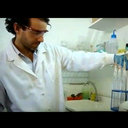
Rodrigo GarcíaInstitute of Scientific and Technical Research for Defense | CITEDEF · DIDER
Rodrigo García
Bsc. Biotechnology
About
15
Publications
21,230
Reads
How we measure 'reads'
A 'read' is counted each time someone views a publication summary (such as the title, abstract, and list of authors), clicks on a figure, or views or downloads the full-text. Learn more
40
Citations
Introduction
Rodrigo García currently works at the DIDER, Institute of Scientific and Technical Research for Defense. Rodrigo does research in Biotechnology. Their current project is 'Hydrogen Production through Dark Fermentation'.
Additional affiliations
April 2011 - present
February 2008 - present
Argentine Navy
Position
- Head of Department
Publications
Publications (15)
Dark fermentation is a hydrogen generating process carried out by anaerobic spore-forming bacteria that metabolize carbon sources producing gas and short-chain acids. The process can be controlled, and the hydrogen harvested if bacteria are grown in a reactor with favorable conditions. In this work, bacteria selected from natural sources were grown...
Sludge from the wastewater treatment plant of the Argentinean Navy icebreaker ship “Almirante Irizar” was used as inoculum for biohydrogen production. The bacterial community was monitored throughout the fermentation, by sequencing 16S rRNA amplicons, to establish the microbial dynamics of the bioreactor over time. The established operating procedu...
Humanity is facing a very urgent problem in the present time that can be regarded as the most important in history. Our future way of life, and maybe even survival, depends on its outcome. The problem is climate change and its consequences. The burst of the human population in the second half of the XX century was accompanied by a growth in human a...
La economía actual es lineal; se produce un bien, se usa hasta que culmina su vida útil y se deshecha. El concepto de economía circular emerge como una estrategia para lograr una economía más sustentable. Dentro de este esquema circular, los bioprocesos son importantes porque permiten tanto obtener productos de valor comercial como tratar residuos...
Para el desarrollo de cualquier actividad vinculada con la Defensa y con el desenvolvimiento y progreso de un país, se requiere de un suministro apropiado de energía. El abastecimiento debe ser confiable como para poder poner en funcionamiento aeronaves, barcos, y otros vehículos milita-res, así como transportar y albergar personal que trabaje para...
In order to determine the feasibility of reducing electricity consumption while maintaining the same services, an action plan was designed at the Institute of Scientific and Technical Research for Defense. Within the plan, work was carried out on three main areas: analyzing the monthly electricity billing for the last year, evaluating important par...
El uso de hidrocarburos como fuente de energía y combustible ha provocado un impacto medioambiental debido al cambio climático, además de que es un recurso cada vez más escaso del que hay una constante y creciente demanda. Esto ha impulsado el desarrollo de recursos renovables que sean limpios para el medioambiente. En este contexto, el hidrógeno e...
The objective of this work is to optimize the production of biological hydrogen by dark fermentation from mixed bacterial cultures, using glucose as carbon source. This paper evaluates the effect on the yield and percentage of hydrogen produced when applying a heat pretreatment to the inoculum. Results show that higher percentages of hydrogen and h...
En el Departamento de I+D en Energías Renovables (DIDER) del Instituto de Investigaciones Científicas y Técnicas para la Defensa (CITEDEF), dirigido por el Dr. Juan Isidro Franco (en convenio con la Escuela Superior Técnica), se desarrollan celdas de combustible tipo PEM (Proton Exchange Membrane) con tecnología nacional que utilizan el hidrógeno c...
RESUMEN: En este trabajo evaluamos la capacidad de un consorcio microbiano, obtenido de una planta de tratamiento de aguas cloacales, de producir hidrógeno en escala de laboratorio. Los inóculos recibieron un pre-tratamiento con calor para seleccionar microorganismos esporulantes productores de hidrógeno y se cultivaron utilizando glucosa como únic...
In a process known as anaerobic digestion (AD) a consortium of microorganisms degrades organic matteer to digested sludge, carbon dioxide and methane. During this process hydrogen is both produced and consumed as an important intermediary. Hence, if you wish to produce hydrogen through biological means, it becomes necessary to intervene in the anae...
Methanogenic and hydrogen-producing bacteria constitute anaerobic bacterial communi-ties. Inhibition of the methanogenic population is a suitable way of enhancing the production of hydrogen, and obtaining abundant and clean quantities of it. In this work, bacteria present in a culture were treated with sucrose solution and the resulting gases opera...
Current processes used for the production of hydrogen consume a great part of the energy they produce and/or depend on fossil fuel consumption, making them inefficient and harmful to the environment. Obtaining hydrogen from living systems by fermentation of organic matter considered waste is a promising alternative for the future. Especially when y...
La fermentación oscura es un proceso metabólico que ocurre naturalmente en ciertas bacterias. Uno de sus subproductos es el hidrógeno, que la bacteria no utiliza y libera a la atmósfera. El gas H2 puede almacenarse para ser utilizado como vector de energía. Otros subproductos son moléculas orgánicas que, a su vez, pueden servir como fuente de carbo...




























